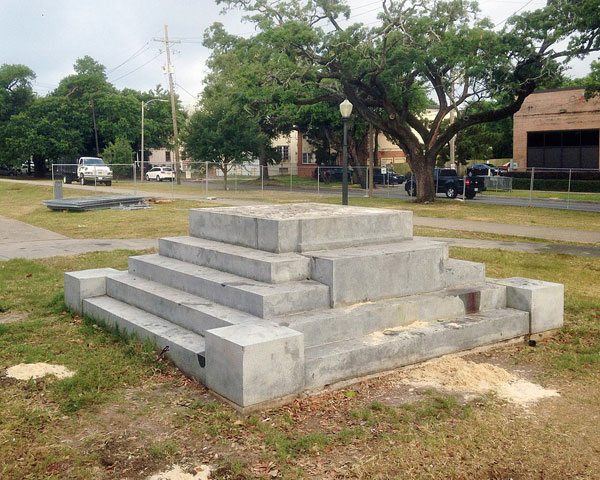
April 18, 2018; WREG
The city of Memphis and the state of Tennessee are butting heads once again over who has power over public spaces, and the fight has turned into a lively debate about who controls the history of the city.
In December, NPQ reported that Memphis sold two city parks to a newly convened nonprofit, Memphis Greenspace, which immediately removed three Confederate statues and put them in storage. This was apparently consciously done to circumvent a state law that says statues located on public property cannot be removed without a special waiver, which the state declined to grant.
But, of course, there were those other Memphians, who opposed the statues’ removal. In January of this year, a judge ordered that Memphis Greenspace enter into mediation with the Sons of Confederate Veterans, who called the statues’ removal unlawful, about what to do with the statues.
That left the state legislature to deal with, and some of its members were unhappy enough with the usurpation of their authority to try to exact monetary punishment. So, in a move fraught with symbolism, the Republican-dominated state legislature voted 56–31 to approve a last-minute budget amendment that cut $250,000 that had been allocated to Memphis for its bicentennial celebration this year.
And, thus, it has turned back full force into what it is: a tussle over who owns history.
Rep. Andy Holt said about the withdrawal of funds, “Today is a demonstration that bad actions have bad consequences, and my only regret about this is it’s not in the tune of millions of dollars.” Holt also added that removing the monuments was erasing history, and “that’s what ISIS does.” We would like to briefly acknowledge the confoundingly horrific comparison between community activists and terrorist groups, between leveling cities and making room for more inclusive narratives.
Sign up for our free newsletters
Subscribe to NPQ's newsletters to have our top stories delivered directly to your inbox.
By signing up, you agree to our privacy policy and terms of use, and to receive messages from NPQ and our partners.
Rep. Steve McDaniel said, “If you recall, back in December, Memphis did something that removed historical markers in the city. It was the city of Memphis that did this, and it was full knowing it was not the will of the legislature.” That is what seems to have upset the state lawmakers: the defiance shown by the city of Memphis. The Commercial Appeal noted in March that three measures designed to give the state historical committee eminent domain powers over all public spaces, or otherwise prevent other groups from doing what Memphis Greenspace did, have all failed. (Chris Herrington at the Commercial Appeal noted that the state historical commission, which initially denied Memphis’ request to lawfully remove the statues, is “populated by members of the fringe Sons of Confederate Veterans,” which seems like an inherent conflict of interest.) One of the bills actually codified what Tuesday’s amendment did: It required removal of state funds from local governments if they removed or relocated historical memorials. Still, it failed where the amendment punishing Memphis passed.
Rep. Raumesh Akbari said, “Arkansas would gladly take us…I didn’t even realize how much y’all disliked Memphis till I got to this Legislature.”
As we said, this controversy is about many things, such as the fight to tell a more inclusive history and make the city a place that welcomes people of color as equal actors in public arenas. It’s also about power and who gets to make decisions about public spaces, narratives, and actors.
Tami Sawyer, a prominent organizer and activist with Take ’Em Down 901, said, “There’s a lot of old white money making a lot of decisions in a majority-black city. And there’s no such thing as old black money, so the power structure is skewed.” Discussing the emotional impact of the historic oppression represented by the statues’ prominence, she told Memphis Flyer reporter Chris Davis, “I can’t think, outside of Native Americans, another group of people that are told to just take it. Just take it. Deal with it.”
State Sen. Lee Harris of Memphis expressed concern that “It means that local elected officials can be punished for lawful decisions that end up rubbing powerful elected officials in Nashville the wrong way.”
Memphians resented the state’s attempt to seize control of their public space and started GoFundMe campaigns to replace the $250,000. The largest, run by Brittney Block, raised nearly $60,000 in a single day. Though city representatives said that the bicentennial would be unaffected by the state’s cut, residents are sending a message about the need to exert control over their own historical legacy and, by extension, their future.—Erin Rubin













